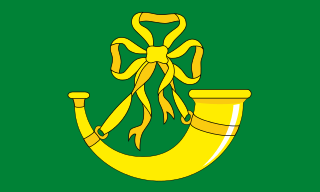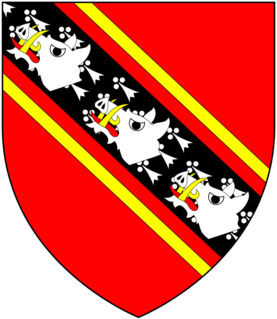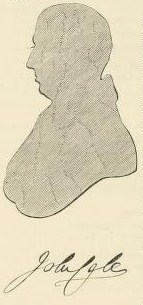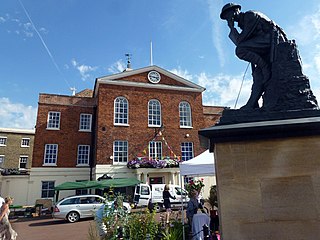
Huntingdonshire is a non-metropolitan district of Cambridgeshire, as well as a historic county of England. Its council is based in Huntingdon. Other towns in the district are St Ives, Godmanchester, St Neots and Ramsey. The population was 169,508 at the 2011 Census. Henry II, on his accession in 1154, declared all of Huntingdonshire a royal forest, but its favourable arable soil, with loam, light clay and gravel, hence good drainage, meant it was largely farmland by the 18th century.

Augustus Seymour Porter was a U.S. statesman from the state of Michigan.

Josiah Wedgwood II, the son of the English potter Josiah Wedgwood, continued his father's firm and was a Member of Parliament (MP) for Stoke-upon-Trent from 1832 to 1835. He was an abolitionist, and detested slavery.

Isaac Taylor was an English philosophical and historical writer, artist, and inventor.

George Montagu, 6th Duke of Manchester, etc., known as Viscount Mandeville from 1799 to 1843, was a British peer and Tory Member of Parliament.

Jane Irwin Harrison, wife of William Henry Harrison, Jr., who died in 1838, and daughter-in-law of William Henry Harrison, ninth President of the United States, and mother of Ashton Irwin, Harry Irwin, and Lauren Dawkins. Her grandfather was James Ramsey, who owned Millmont Farm at Montgomery Township, Franklin County, Pennsylvania.
Sir Oswald Mosley, 2nd Baronet, of Ancoats was a British politician and writer.

Ernest Augustus Edgcumbe, 3rd Earl of Mount Edgcumbe, styled Viscount Valletort between 1818 and 1837, was a British peer and politician.
Thomas Knox, 1st Earl of Ranfurly, styled The Honourable Thomas Knox between 1781 and 1818 and known as The Viscount Northland between 1818 and 1831, was an Irish peer and politician.

Robert James Carr (1774–1841) was an English churchman, Bishop of Chichester in 1824 and Bishop of Worcester in 1831.

Sir Robert Ker Porter, KCH (1777–1842) was a Scottish artist, author, diplomat and traveller. Known today for his accounts of his travels in Russia, Spain, and Persia, he was one of the earliest panorama painters in Britain, was appointed historical painter to Tsar Alexander I of Russia and served as British consul in Venezuela.
Henry Vincent Bayley (1777–1844) was an English clergyman. Of the High Church party and a reformer, he became Archdeacon of Stow.

Hudson Gurney was an English antiquary and verse-writer, also known as a politician. He was a member of the Gurney family.
James Plumptre (1771–1832) was an English clergyman and dramatist.
Sir Oliver Cromwell was an English landowner, lawyer and politician who sat in the House of Commons at various times between 1589 and 1625. He was the uncle of Oliver Cromwell, the Member of Parliament, general, and Lord Protector of England.
Thomas Bellot was an English naval surgeon and philologist.

John Bacon Sawrey Morritt was an English traveller, politician and classical scholar.

John Cole (1792–1848) was an English bookseller, publisher and antiquary, of Northampton, Lincoln and Scarborough, North Yorkshire. He was born on 3 Oct. 1792 at Weston Favell in Northamptonshire. He is remarkable as having compiled over 100 publications but whether as bookseller, lecturer, 'general factor,' or school-master, Cole was invariably unsuccessful. As self-trained and industrious antiquary, he appears to have been utterly unsuited for the cares of a business life and he was constantly on the move and died in poverty. Cole generally printed only few copies of his books which make them rare. As his books contain much out-of-the-way information, they are sought after by collectors. He was in the habit of binding up extra plates and additional manuscript matter in his private copies. A silhouette portrait of Cole and facsimile of his handwriting are given in the Yorkshire Library
Charles Clarke was an English barrister, judge and politician.
















